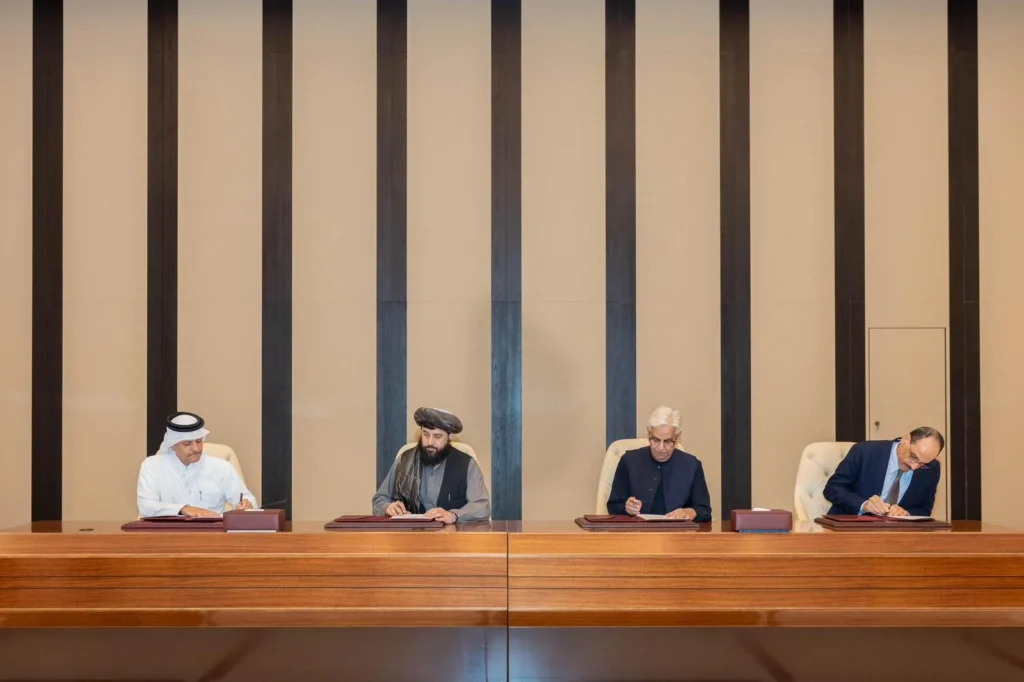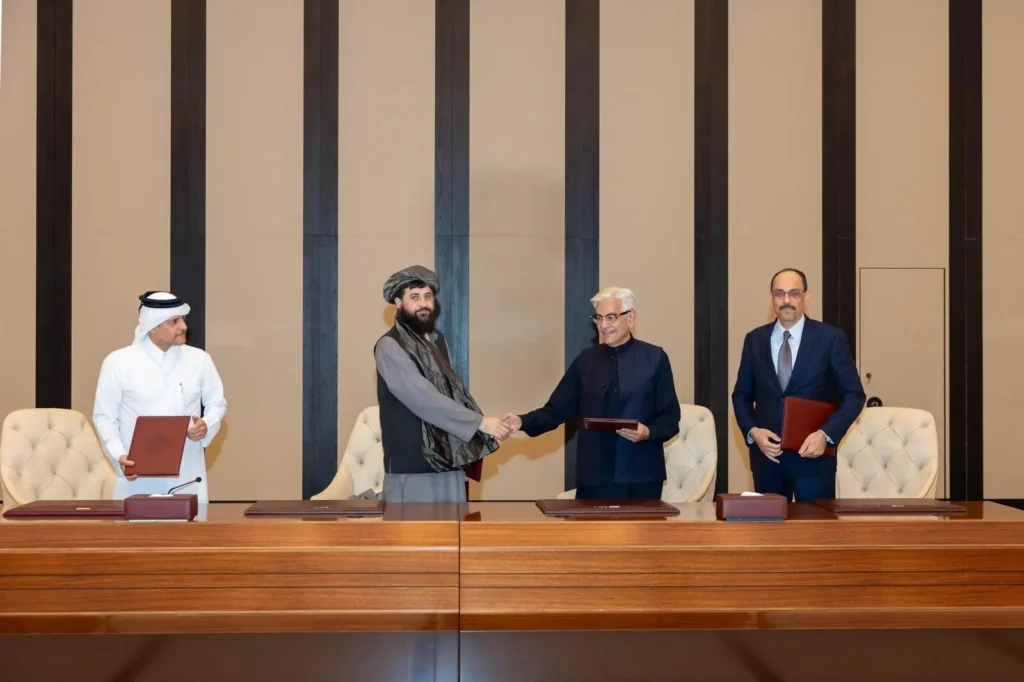The Doha Agreement between Pakistan and Afghanistan has emerged as a watershed moment in South Asian diplomacy, marking a critical breakthrough following days of deadly cross-border violence. This landmark ceasefire accord, announced on October 19, 2025, represents the most significant peace initiative between the two neighbors since the Taliban’s return to power in Kabul.
Historic Peace Talks Yield the Doha Agreement Between Pakistan and Afghanistan
After 13 hours of intensive negotiations mediated by Qatar and Turkey, Pakistan’s Defense Minister Khawaja Muhammad Asif confirmed that the Doha Agreement between Pakistan and Afghanistan had been successfully concluded. The talks, held in Qatar’s capital, brought together Pakistan’s defense chief alongside Afghanistan’s Defense Minister Mullah Muhammad Yaqoob, marking the highest-level bilateral engagement in recent years.
The Doha Agreement between Pakistan and Afghanistan includes several crucial provisions that address the core security concerns of both nations. Under this accord, all terrorist activities originating from Afghan soil against Pakistan will cease immediately, while both countries commit to respecting each other’s territorial sovereignty. This represents a fundamental shift from the previous cycle of accusations and retaliatory strikes that had characterized their relationship.
Qatar’s Ministry of Foreign Affairs officially announced the Doha Agreement between Pakistan and Afghanistan, stating that both sides had agreed to establish mechanisms for consolidating lasting peace and stability between their nations. The agreement also includes provisions for follow-up meetings to ensure the ceasefire’s sustainability and verify its implementation through credible and effective monitoring systems.

Background to the Doha Agreement Between Pakistan and Afghanistan
The recent Doha Agreement between Pakistan and Afghanistan emerged following a week of intense border clashes that began on October 11, 2025. The violence escalated when Pakistani forces conducted precision airstrikes in Afghan territory, targeting militant camps allegedly linked to the Tehreek-e-Taliban Pakistan (TTP) and the Hafiz Gul Bahadur group.
Pakistan has consistently demanded that Kabul take “verifiable action” against TTP militants operating from Afghan territory. The militant group, which emerged in 2007 during the U.S.-led war on terror, has been responsible for numerous attacks against Pakistani security forces and civilians. According to data from the Conflict Location Event Data Project, TTP conducted at least 600 attacks against security forces in the past year.
The catalyst for the recent violence was a militant attack on October 8 that killed Pakistani security personnel, prompting Islamabad to deliver a strong demarche to Afghanistan’s interim government. Pakistan demanded immediate action against terrorist groups, including the apprehension and handover of TTP leadership operating from Afghan soil.
Key Provisions of the Agreement
The Doha Agreement between Pakistan and Afghanistan establishes a comprehensive framework for peace that goes beyond a simple ceasefire. Defense Minister Khawaja Asif emphasized that terrorism conducted from Afghanistan against Pakistani soil would stop immediately under the terms of this agreement. Both countries have pledged to respect each other’s territorial integrity and refrain from supporting armed groups targeting the other nation.
In a groundbreaking development, Afghanistan’s official government spokesperson, Zabihullah Mujahid, confirmed that the Doha Agreement between Pakistan and Afghanistan contains a critical provision that marks a significant shift in Taliban policy. According to Mujahid’s official statement,
“It has been decided that neither country will undertake any hostile actions against the other, nor will they support groups carrying out attacks against Pakistan”.
This represents a substantial departure from previous positions where Afghanistan only pledged not to allow the use of its soil, as the Taliban government has now explicitly committed to not supporting anti-Pakistan militant groups in any capacity.
It has been decided that neither country will undertake any hostile actions against the other, nor will they support groups carrying out attacks against the Government of Pakistan. Both sides will refrain from targeting each other’s security forces, civilians,
— Zabihullah (..ذبـــــیح الله م ) (@Zabehulah_M33) October 19, 2025
4/5
A significant aspect of the Doha Agreement between Pakistan and Afghanistan is the establishment of third-party mediation mechanisms to assess claims and ensure adherence to the agreement’s terms. This represents a crucial innovation in bilateral relations, providing neutral oversight for potential disputes or violations. Both sides have committed to refraining from targeting each other’s security forces, civilians, and critical infrastructure.
The agreement also schedules follow-up meetings, with the next round of discussions planned for October 25, 2025, in Istanbul. These continuing dialogues aim to review progress on ceasefire implementation and address any emerging challenges that might threaten the peace process.
International Mediation and Support
The success of the Doha Agreement between Pakistan and Afghanistan owes much to the diplomatic efforts of Qatar and Turkey, who served as neutral mediators throughout the negotiation process. Qatar’s role as a facilitator builds upon its established position as a venue for Afghan peace initiatives, having hosted Taliban representatives since 2013.
Turkey’s involvement as a co-mediator adds another dimension to international support for the peace process. Both countries have expressed appreciation for the mediation efforts, with Defense Minister Asif specifically thanking Qatar and Turkey for their crucial role in facilitating dialogue. Additionally, Malaysian Prime Minister Anwar Ibrahim played a supportive role, holding telephone conversations with both Pakistani Prime Minister Shehbaz Sharif and Afghan Prime Minister Mullah Mohammad Hassan Akhund, emphasizing the importance of continued dialogue and offering assistance in resolving the matter.
The international community has welcomed the Doha Agreement between Pakistan and Afghanistan as a positive development for regional stability. The agreement demonstrates that diplomatic engagement can successfully address even the most entrenched security disputes when supported by effective international mediation.
Implications for Regional Security
The Doha Agreement between Pakistan and Afghanistan carries significant implications for broader regional security dynamics. The ceasefire provides an opportunity to address long-standing grievances that have plagued bilateral relations, including border demarcation issues, militant group activities, and economic cooperation.
Pakistan’s previous military operations against terrorist sanctuaries in Afghanistan had raised concerns about escalating tensions. Information Minister Attaullah Tarar reported that Pakistani precision strikes had eliminated approximately 70 militants, while emphasizing that civilian targeting allegations were false. The new agreement offers a diplomatic alternative to military solutions.
For Afghanistan’s Taliban government, the Doha Agreement between Pakistan and Afghanistan represents an opportunity to demonstrate its commitment to regional peace and stability. Compliance with the agreement’s terms could enhance the Taliban’s international standing and support their efforts to gain broader diplomatic recognition.
The Doha Agreement between Pakistan and Afghanistan stands as a testament to the power of diplomatic engagement in resolving complex security challenges. While previous peace initiatives have faced implementation difficulties, the comprehensive nature of this accord, combined with international mediation and verification mechanisms, offers genuine hope for lasting peace between these two important South Asian neighbors. The success of this agreement will largely depend on both countries’ commitment to honoring their pledges and working constructively through the established follow-up processes.


